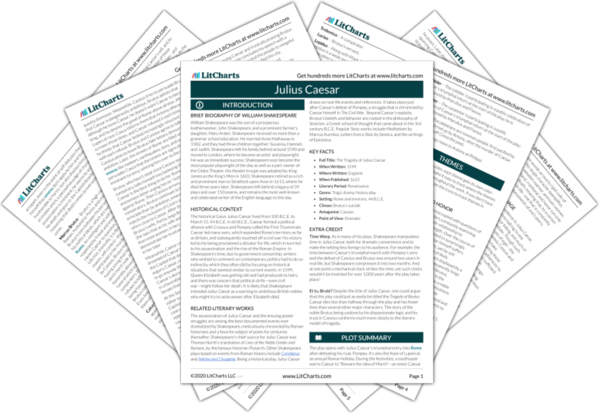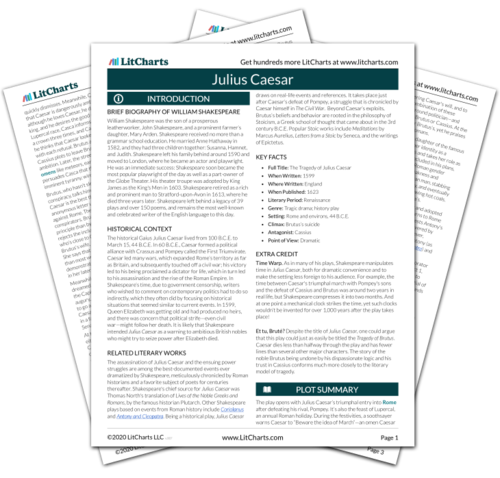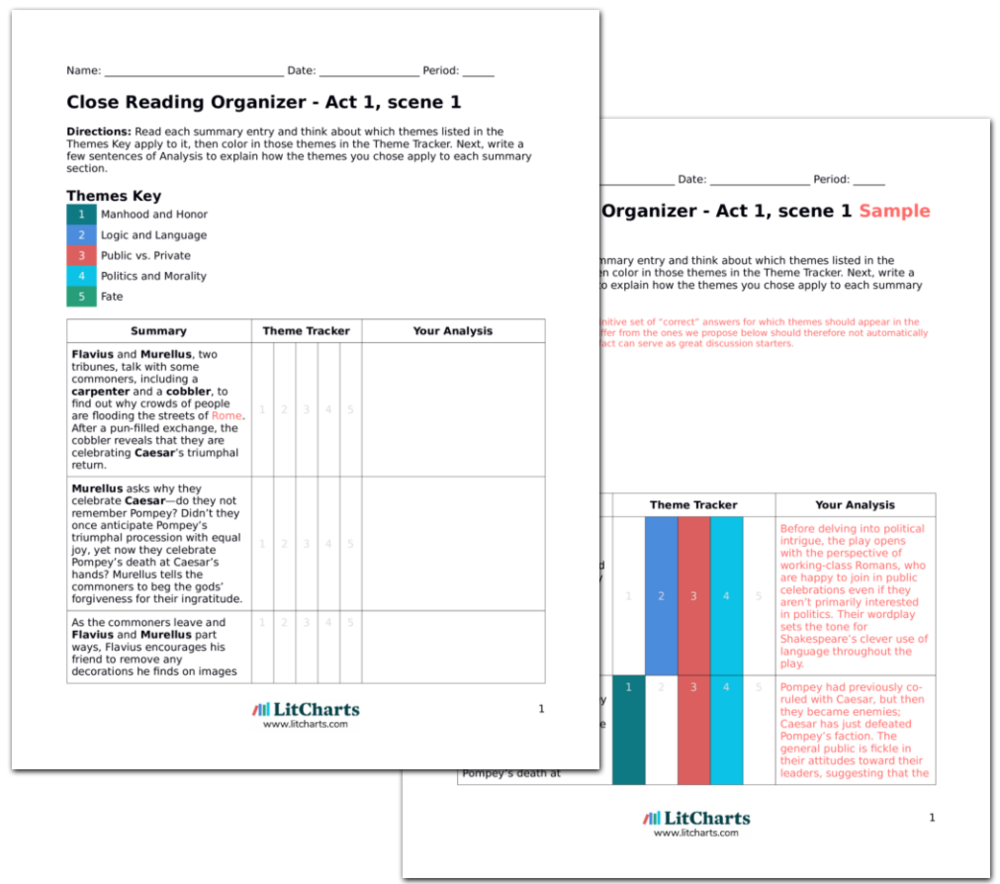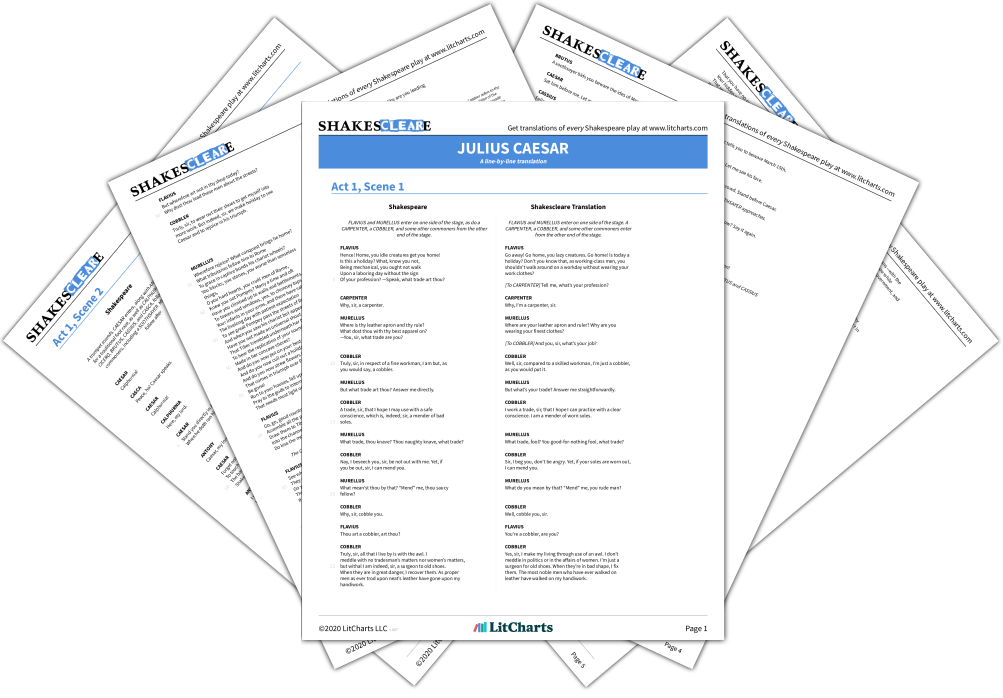![]()
LitCharts assigns a color and icon to each theme in Julius Caesar, which you can use to track the themes throughout the work.
![]()
![]()
![]()
![]()
![]()
There’s more thunder and lightning. Julius Caesar enters in his nightgown, unable to sleep. Calpurnia has been talking in her sleep, dreaming of his murder. Caesar sends a servant to order the priests to do sacrifices and report back to him the results of their auguries.
Omens continue to fill the sky. Calpurnia's apparent gift for prophecy aligns her with the supernatural elements of the play and contrasts her with the logical Portia. Caesar’s superstition is on display; in light of the soothsayer’s warning, the portents, and his wife’s dream, he appears to be uneasy about what the day will bring.
Active Themes![]()
![]()
Calpurnia enters and tells Caesar that he mustn’t leave the house today. Although she has “never stood on ceremonies,” she’s frightened by reports of a lioness birthing in the streets, blood drizzling from the sky, and ghosts roaming about. Caesar replies that the gods’ purposes can’t be avoided; he will leave anyway, because these omens aren’t just signs for him, but for the world in general. Death is inevitable and comes to everyone when it’s fated to come.
Caesar suspects that the omens are for him and that Calpurnia is right, but his ego wins out—he wants to appear invincible, so he has to venture out of the house anyway. He is trapped by his invulnerable self-image. He justifies his behavior by claiming that fate is inevitable, and that the signs don’t necessarily apply to him.
Active Themes![]()
![]()
![]()
![]()
![]()
The servant returns with a worrying omen —the sacrificed animal was found to contain no heart, indicating that Caesar shouldn’t leave the house. Caesar rebuffs this interpretation, saying the heartless sacrifice is a warning against cowardice. He is “more dangerous than [danger] itself” and will go forth. Calpurnia replies that Caesar’s wisdom is being outweighed by his confidence. She begs him to stay home, saying Caesar can use her fear as an excuse, and he relents.
Though the supernatural warnings are mounting, Caesar twists their interpretation in his favor, needing to project invulnerability. Calpurnia sees through this façade and offers him a way out. The fact that Caesar gives in to Calpurnia’s worries suggests that he is not as confident as his outward arrogance would suggest.
Active Themes![]()
![]()
![]()
![]()
Decius arrives to accompany Caesar to the Senate House. Caesar tells Decius to inform the Senate that he chooses not to come. Decius insists on being given a reason for Caesar’s absence—otherwise he’ll be laughed at when he delivers the message. Caesar replies that his will is reason enough. However, he privately admits that Calpurnia has asked him to stay home because of her dream of Caesar’s statue spurting blood. Decius replies that this dream is actually fortunate—it signifies that Caesar’s blood will revive Rome . Besides, the Senate is planning to give Caesar a crown today, and if Caesar stays away, they might change their minds. Caesar quickly decides to go after all.
Caesar keeps trying to balance between his superstition and his ego—he asserts his will to redirect attention from his apparent weakness. In keeping with his mission, Decius picks up on Caesar’s superstition and fear by offering a flattering interpretation of the dream that will compel Caesar to go anyway. The flattery works, suggesting that Caesar does harbor ambition and will ignore his own instincts in order to further his political agenda.
Active Themes![]()
![]()
![]()
![]()
"My students can't get enough of your charts and their results have gone through the roof." -Graham S.

The rest of the conspirators enter, followed by Antony . Caesar greets them all and teases Antony about his late-night partying. Then he invites them all inside for a drink of wine before they depart for the Senate together. Privately, Brutus laments what he and his fellow conspirators are about to do.
Antony’s late appearance after a night of partying reinforces the other men’s perception that he is harmless. Caesar’s jovial greetings heighten the dramatic irony, while the audience is aware of what’s about to happen and witnesses Brutus’s anguish over it.
Active Themes![]()
![]()

“Would not have made it through AP Literature without the printable PDFs. They're like having in-class notes for every discussion!”
Get the Teacher Edition
“This is absolutely THE best teacher resource I have ever purchased. My students love how organized the handouts are and enjoy tracking the themes as a class.”
Julius Caesar in Plain English
“Every teacher of literature should use these translations. They completely demystify Shakespeare. Students love them!”
Copyright © 2024 All Rights Reserved Save time. Stress less.AI Tools for on-demand study help and teaching prep.
 Quote explanations, with page numbers, for over 44,279 quotes.
Quote explanations, with page numbers, for over 44,279 quotes. PDF downloads of all 2,001 LitCharts guides.
PDF downloads of all 2,001 LitCharts guides. Expert analysis to take your reading to the next level.
Expert analysis to take your reading to the next level. Advanced search to help you find exactly what you're looking for.
Advanced search to help you find exactly what you're looking for.
 Expert analysis to take your reading to the next level.
Expert analysis to take your reading to the next level. Advanced search to help you find exactly what you're looking for.
Advanced search to help you find exactly what you're looking for.